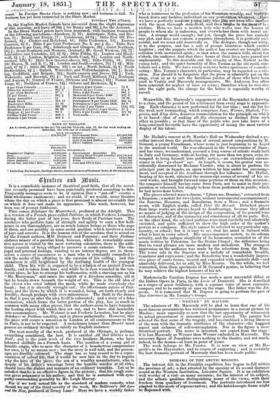gljtair15 It1II1 11usir.
It is a rentarkabIe instance of theatrical good faith, that all the novel- ties recently promised have been punctually produced, according to date. Frequently managers seem to be of opinion that a "put-off" creates a little wholesome excitement; and we could, if we would, name theatres where the day on which a piece-is.first promised is almost invariably that on which it does not make.its appearance. This week, however, has been one of prompt fulfilment. First conies Belphegor the Monnteban7-, produeed at the Adelphi. This is a version of a French piece called Paillasse, in which Frederic Lemaitre, during the latter part of last year, drew floods- of Parisian tears. The acrobates who perform feats of strength' and agility to earn a few half- pence in our thoroughfares, are as much human beings as those who gape at them and are possibly in some social position which involves a series of-jays and sorrows. It is the human side-of the acrobate that is seized on by the French authors, MM. Deanery and Fournier; and their .Paidlasse -endures misery of a peculiar kind, because, while his remarlmblysensi- tive nature is visited by the most torturing calamities, there is the addi- tional anguish of bein,, obliged to preserve a comic exterior. The con- jugal and paternal feelings, existing to an intense degree, are in them- selves a source of uneasiness to a man who is constantly compelled to risk the necks of his offspring in the exercise of his calling ; and this uneasiness is still heightened by the declining health of the youngest child. Then his wife is supposed to be a relation of an ancient French family, and is taken from him.; and while he is thus wounded in the ten- derest place, he has to attempt his buffooneries, with a starving son as his "Mu Merryman" and raises the mirth of a frivolous assembly, till at last he breaks down--beneath the weight of wo. This is the old idea of the clown who cried behind( the utask, while •he made everybody else laugh ; but it is cleverly' Wrought out ; the affectionate nature of Pail- lasse, and the blows by which it is wounded, being set forth clearly and forcibly, though perhaps with over-minuteness. The fault in the drama is, that it goes on after the idea it-elf is exhausted ; and a story of a false accusation, which forms the latter portion of the play, has so much in common with many other pieces, that the authors seem to have forgotten the leading object with which they set out, and to have slid insensibly into commonplace. Mr: Webster is not Frederic Lemaitre, but he plays Belphegor or Paillasie sensibly,•and in places pathetically. However, that the piece will create a sensation in London at all commensurate to that in Paris, is not to be expected. A melodrama longer than Hamlet must possess no ordinary strength to satisfy an English audience.
The not novelty of the week, produced at the Olympic, is perhaps, evorytiting,tionsidered, the best. - It is entitled All that olitters is not Gold; and is the joint work of the two broffhe,rs Morton, who have laboured, skilfully on a French basis. The position of a young girl of humble origin, who to save the character of a benefactress compromises her own, is by no means new; but the story is well told, and the person- ages are forcibly col . The stage has so bog ceased to be a repro- sedation of actual WO? Tibet it would be now late in the day to inquire why the h of thO'Rpce, the son of a wealthy manufacturer, who in despite et' ' Aither's Mornings loves the humble maiden at all risks, should havq, .dialeet and manners of an ordinary bumpkin. Let us be satisfied thathe la an, effective figure in the picture ; that, his rough exte- rior gives poignancy to his pathos; and that ho sustained with sym-
pathy-coramainling geniality by Leigh Murray.
For if we took' actual life as the standard of medern•comedy, what should we say of the third novelty of the week, Mr. Sullivan's Old Love and the New produced at Drury Lane ? Here we have a worldly father who is boisterous in the profession of his Mammon-worail 9, and. read 0
knock down any luckless individual on any proFocatisSinfiy e with the most thoro
we have a perfectly inuntgrttognOWS1WheritS on&bda irig-froid,-entl then Irk- ;ha iriAnglboArlff her
er
vietiine Here we have a maiden lady who walks into the houses of people to-whom she is unknown; and overwhelms them with moral ad- vice. A strange world enough ;. but yd, though the- piece has scarcely any plot, and does hot 'contain' a repartee throughout, it is perfectly sue- cessful,.and we must add deservedly so. The dialogue, though not witty, is to the purpose, and has a .sort of prosaic bluntness which excites laughter ; and the puppets which the author has treated are brought into collision with unwearied-spirit; so that when the curtain falls, about ten o'clock, the audience find that three hours of their lives have passed not unpleasantly. To this desirable end the vivacity of Mrs. Nisbett as the young lady, and the quiet formality of Mrs. Taman. as the old maid, con- tribute not a little. We have rarely seen two better specimens of comedy- acting Mrs. Ternan's character, in particular, may be regarded as a cre- ation. Nor should it be forgotten that the piece is admirably put on the stage, even so as to suit the fastidious palates of those who have been used to Vestris and Macready managements. Mr. Anderson has often teen censured for neglect of mist en scene ; therefore when he does step into the right path, the change for the better is especially worthy of record.


























 Previous page
Previous page